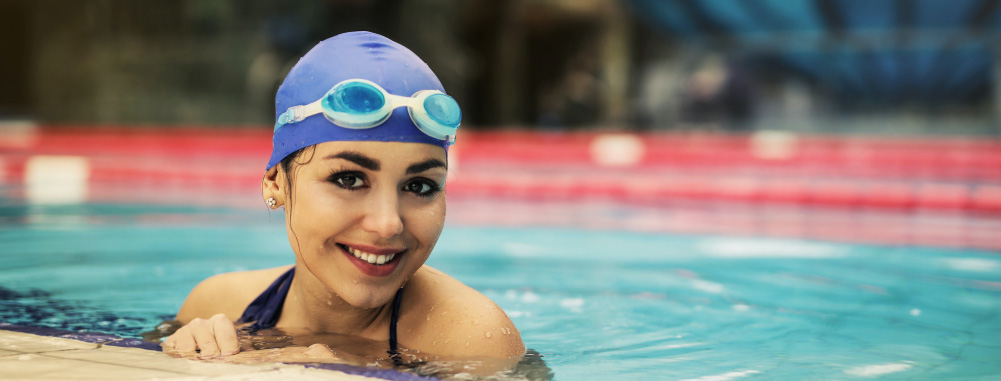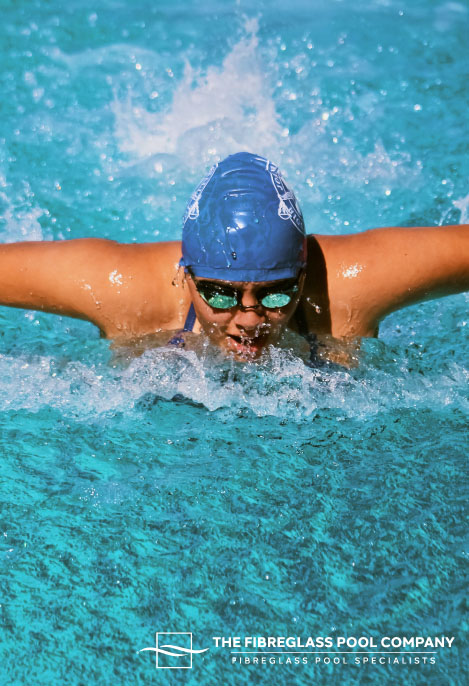From The Fibreglass Pool Company Blog
Swimming is a great way to get in shape and increase your stamina and lung capacity. It can also help you improve your respiratory health by increasing buoyancy and oxygen delivery to your brain. If you have a fibreglass swimming pool of your own in your backyard, you can take advantage of this. The benefits of swimming are many, some of which we will get to in this article. So, continue reading.

Improved lung function
Swimming is a great way to exercise the lungs, which can improve lung function and endurance. The muscles of your lungs are used when you swim, and therefore this activity helps strengthen them. Swimming also helps improve your overall fitness level because it requires both cardiovascular strength and muscular endurance.
This is an excellent sport for improving lung capacity because it involves breathing while moving in water at high speed. It’s important that you have adequate experience in swimming before trying any other type of exercise that might increase your lung capacity further. Otherwise, you could risk injury or illness if not done correctly.
Better buoyancy
Buoyancy is the force that keeps you afloat. It’s a result of your body’s density, which means that lighter people have lower buoyancy. The denser your body, the more buoyant you are and thus able to stay afloat longer. In this way, swimming can help improve lung capacity and endurance by increasing your overall body mass. It is also known for improving muscle strength within certain areas, such as the legs and arms.
The bigger picture here is that swimming improves both lung capacity and endurance because it promotes good health overall. It does so by helping you maintain your weight through proper dieting choices as well as physical activity. Plus, you won’t have to worry about becoming dehydrated while swimming.
Increased oxygen to the brain
Swimming is a great way to improve your oxygen intake—and it may even help with brain function. Research has shown that short bursts of swimming can increase the amount of blood that reaches your brain. This in turn gives you an improved ability to think and remember things. If this sounds like something you’d like to try for yourself, but don’t have a swimming pool of your own, here’s how:
- Find a pool and sign up for lessons with one of the instructors. Most pools offer lessons every week or two at different times throughout the year.
- Once you’ve signed up, head over there immediately after work so that by 7:30 pm when class starts, no matter what else is going on.

Reduced Symptoms of Asthma
Swimming is a great way to exercise without aggravating asthma symptoms. The buoyancy of the water helps to increase lung capacity, making swimming an ideal activity for people who suffer from asthma.
Not only does swimming help reduce the frequency of attacks. Exercise has been shown in multiple studies to be beneficial for people with asthma because it helps keep asthma under control while improving their overall health.
Increased Core Strength
Swimming is a great exercise for improving your core strength. It requires you to engage all of your abdominal muscles, including those that lie between the ribs and pelvis. This can help you improve your posture, breathing and endurance—all of which will help you become a better athlete in general. Swimming in the morning has proven to help this, as it is a cooler time to start exercising.
The other benefit of improved core strength is that it can also help with other sports like basketball or volleyball. When playing these sports, it’s important for you to be able to maintain balance and stability throughout your movements.
Stronger respiratory muscles
The respiratory muscles are your diaphragm and the intercostal muscles that surround it. When you swim, these muscles help to move air in and out of your lungs. They also play a role in maintaining good posture as well as strengthening them through exercise such as swimming.
Swimming can lead to improved lung capacity, which means more oxygen can be used by cells throughout the body when we breathe. This improvement in lung capacity may be due to stronger respiratory muscles. When you exercise your respiratory system, it becomes stronger so that more oxygen is absorbed into your bloodstream with each breath. This increases endurance levels and improves overall health.

Improved posture and spine
Swimming is a great way to improve posture and spine strength. It is also a great way to see how your body responds to different exercises because it forces you to work with different muscles in different ways.
The following are some exercises that you can do at your fibreglass swimming pool:
- Paddles – Use paddles or swim fins on either hand while swimming freestyle (or backstroke). The goal here is to feel like you’re working hard while remaining relaxed and comfortable in the water. This will help strengthen your arms and legs as well as increase endurance levels overall by increasing blood flow throughout all parts of your body.
- Butterfly kick – This move involves kicking both feet simultaneously while holding onto something stationary (like another person). It’s important not only because it works out both sides but also because it teaches balance. This helps prevent falls during everyday activities such as walking up and down the stairs.
Boosted Breath-Holding Capability
Breathing control is a key component of swimming, and it can be improved. When you breathe in the water, your lungs fill with air that is transferred to the bloodstream. Swimming helps you develop better breathing habits as well as lung capacity. This means that you may be able to hold your breath longer than before!
Breathing control is also important for many other sports too. If you want to play football or basketball, for example, then learning how to control your breathing will help improve these skills too.
Conclusion
It is well known that swimming can improve lung capacity and endurance. The improvements in lung function can be attributed to improved buoyancy, increased oxygen delivery to the brain and reduced symptoms of asthma. The increased core strength from swimming has also been shown to reduce back pain. It also improves posture when standing up from sitting or lying down on your back.
From The Fibreglass Pool Company Blog
Swimming is a great way to get in shape and increase your stamina and lung capacity. It can also help you improve your respiratory health by increasing buoyancy and oxygen delivery to your brain. If you have a fibreglass swimming pool of your own in your backyard, you can take advantage of this. The benefits of swimming are many, some of which we will get to in this article. So, continue reading.

Improved lung function
Swimming is a great way to exercise the lungs, which can improve lung function and endurance. The muscles of your lungs are used when you swim, and therefore this activity helps strengthen them. Swimming also helps improve your overall fitness level because it requires both cardiovascular strength and muscular endurance.
This is an excellent sport for improving lung capacity because it involves breathing while moving in water at high speed. It’s important that you have adequate experience in swimming before trying any other type of exercise that might increase your lung capacity further. Otherwise, you could risk injury or illness if not done correctly.
Better buoyancy
Buoyancy is the force that keeps you afloat. It’s a result of your body’s density, which means that lighter people have lower buoyancy. The denser your body, the more buoyant you are and thus able to stay afloat longer. In this way, swimming can help improve lung capacity and endurance by increasing your overall body mass. It is also known for improving muscle strength within certain areas, such as the legs and arms.
The bigger picture here is that swimming improves both lung capacity and endurance because it promotes good health overall. It does so by helping you maintain your weight through proper dieting choices as well as physical activity. Plus, you won’t have to worry about becoming dehydrated while swimming.
Increased oxygen to the brain
Swimming is a great way to improve your oxygen intake—and it may even help with brain function. Research has shown that short bursts of swimming can increase the amount of blood that reaches your brain. This in turn gives you an improved ability to think and remember things. If this sounds like something you’d like to try for yourself, but don’t have a swimming pool of your own, here’s how:
- Find a pool and sign up for lessons with one of the instructors. Most pools offer lessons every week or two at different times throughout the year.
- Once you’ve signed up, head over there immediately after work so that by 7:30 pm when class starts, no matter what else is going on.

Reduced Symptoms of Asthma
Swimming is a great way to exercise without aggravating asthma symptoms. The buoyancy of the water helps to increase lung capacity, making swimming an ideal activity for people who suffer from asthma.
Not only does swimming help reduce the frequency of attacks. Exercise has been shown in multiple studies to be beneficial for people with asthma because it helps keep asthma under control while improving their overall health.
Increased Core Strength
Swimming is a great exercise for improving your core strength. It requires you to engage all of your abdominal muscles, including those that lie between the ribs and pelvis. This can help you improve your posture, breathing and endurance—all of which will help you become a better athlete in general. Swimming in the morning has proven to help this, as it is a cooler time to start exercising.
The other benefit of improved core strength is that it can also help with other sports like basketball or volleyball. When playing these sports, it’s important for you to be able to maintain balance and stability throughout your movements.
Stronger respiratory muscles
The respiratory muscles are your diaphragm and the intercostal muscles that surround it. When you swim, these muscles help to move air in and out of your lungs. They also play a role in maintaining good posture as well as strengthening them through exercise such as swimming.
Swimming can lead to improved lung capacity, which means more oxygen can be used by cells throughout the body when we breathe. This improvement in lung capacity may be due to stronger respiratory muscles. When you exercise your respiratory system, it becomes stronger so that more oxygen is absorbed into your bloodstream with each breath. This increases endurance levels and improves overall health.

Improved posture and spine
Swimming is a great way to improve posture and spine strength. It is also a great way to see how your body responds to different exercises because it forces you to work with different muscles in different ways.
The following are some exercises that you can do at your fibreglass swimming pool:
- Paddles – Use paddles or swim fins on either hand while swimming freestyle (or backstroke). The goal here is to feel like you’re working hard while remaining relaxed and comfortable in the water. This will help strengthen your arms and legs as well as increase endurance levels overall by increasing blood flow throughout all parts of your body.
- Butterfly kick – This move involves kicking both feet simultaneously while holding onto something stationary (like another person). It’s important not only because it works out both sides but also because it teaches balance. This helps prevent falls during everyday activities such as walking up and down the stairs.
Boosted Breath-Holding Capability
Breathing control is a key component of swimming, and it can be improved. When you breathe in the water, your lungs fill with air that is transferred to the bloodstream. Swimming helps you develop better breathing habits as well as lung capacity. This means that you may be able to hold your breath longer than before!
Breathing control is also important for many other sports too. If you want to play football or basketball, for example, then learning how to control your breathing will help improve these skills too.
Conclusion
It is well known that swimming can improve lung capacity and endurance. The improvements in lung function can be attributed to improved buoyancy, increased oxygen delivery to the brain and reduced symptoms of asthma. The increased core strength from swimming has also been shown to reduce back pain. It also improves posture when standing up from sitting or lying down on your back.


